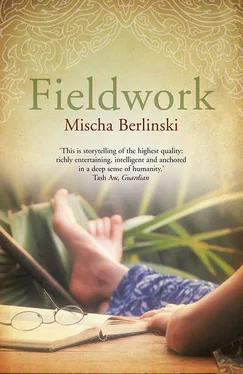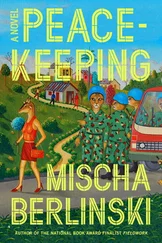After lunch, the villagers dozed. The pigs rooted in the mud and then, having dug themselves comfortable wet beds, stretched out; the dogs found quiet places under the houses and lay their flea-bitten heads on their worn paws; the chickens pecked industriously at slow-moving bugs; lazy clouds gathered together slowly in preparation for the afternoon rainstorm; the bullocks were tethered and dozed in their traces; water slithered down the bamboo pipes and dripped into the ceramic cisterns; the clang of the blacksmith's hammer petered out; the last woman pounding rice or grinding corn stretched her arms out, yawned, balanced her basket on her hip, and wandered home. This was Martiya's favorite time of the day. While the rest of Dan Loi napped, sometimes Martiya would take advantage of the opportunity to be alone and clamber up a nearby rock, from which she could see the entire village. Seen from this perspective, the village was nothing more than a clearing in the forest, houses made from things cut down in the forest — green bamboo streaked with yellow, heavy brown oak, black mahogany, and golden rattan, the forest for a moment tamed, paused, and reordered. She could see nothing that was not from the forest. The Dyalo were slash-and-burn farmers, and when all the forest within a half day's walk of the village had been cut down, set on fire, planted, burned again, planted again, and then exhausted, the people of Dan Loi would pack up their belongings and move on, as they had once left other villages. The forest would close in again.
Martiya was startled by the instability of her emotional life in Dan Loi. She had always been proud of her even keel, especially compared to her more unstable girlfriends: she called it her Dutch side. Karen had been capable of dissolving into tears at even a sidelong glance in a graduate seminar, and a failed romance left her as solidly bound to her bed as a limpet to a rock. Martiya had always considered these displays of emotion distasteful, and had taken a certain satisfaction in her masculine stolidity. Now she was frequently on the edge of tears. Sometimes Martiya would take Ping, Lai-Ma and Farts-a-Lot's three-year-old, on short walks around the village. On one such promenade, Ping tripped over an exposed root and tumbled hard on the muddy path. He began to cry. Martiya had never been around children before in her life and she was surprised by her instinctive reaction, to pick the boy up, cradle him on her hip, and stroke his brow. She was even more surprised that the boy found the gesture consoling, and by the time they made their way back to the hut, he was asleep in her arms. Martiya, however, found herself choking back tears, and she didn't know why. She wasn't even sad , not in any way she could identify, just overwhelmed. She wrote to Karen that she had never in her life dreamed so vividly: nightmares, fantasies, erotic dreams, and, above all, regularly recurring dreams that she was bathing herself by the banks of a running river. She was soaping herself, then stepping into the river, then being carried downstream. These dreams were often so intense that she would wake up in the morning and the village would seem to her less substantial than her visions from the night before. In the course of a single day, Martiya would veer from tears to euphoria and back to tears.
The euphoria was as real and unexpected a thing as the tears. She'd be walking back from the fields in the late afternoon, alone on a mountain path, she'd climb over a rock and see the big green valley spread out below, and suddenly her delicate stomach would rise up behind her lungs and constrict her breath with a happiness so intense she could feel it. Just like her unexpected bursts of sadness, these unexpected bursts of concentrated happiness were a new thing, unanticipated and strange.
Martiya had the good fortune to arrive in the village at a time when both men and women still wore the traditional dress, and in the early evenings, when Martiya saw the villagers wandering barefoot back from the fields in their hand-woven clothes — the women in their brightly colored shifts and flashing silver jewelry, long black skirts fringed in brilliant crimson and gold trailing to their ankles; the black turbaned men in simple gray tunics, their only adornment always across their shoulders on a rattan string, the jaw of some tiger or bear dead now many generations, a family heirloom — sometimes when she saw the villagers, Martiya thought that she had tumbled off of the Earth itself. This was a different world. Farts-a-Lot was an exception, with his thick beetle brow and tiny suspicious eyes, but the Dyalo were generally a handsome people, tall, with dignified faces and rich black hair. They moved gracefully and were athletic and strong. They had features that were familiar but which she couldn't quite place: not cute like the Thai or hard and nervous like the Lahu, but mysterious and aristocratic, with pale skin somewhere between the color of honey and the color of wheat bread, high cheekbones, long noses, and elegant arching lips. Now that Martiya had been in the village six months, she started to notice that the Dyalo never slouched, and they used their bodies in just slightly unfamiliar ways: the men walked barefoot to the rice fields with their backs very straight but their legs slightly bowed; the women threshed the paddy into the large bamboo baskets with an explosive motion of their hips and shoulders; in the evenings, everyone squatted on their heels and rocked. They were an intensely attractive people. Martiya liked Dyalo hands, which were long-fingered and muscular. The Dyalo had adopted the Thai game of takraw , a cross between volleyball and Hacky Sack played with a small woven bamboo ball, and Martiya thought that there was no more charming sight in all of Asia than when, in the late afternoons, the young men leaped like graceful acrobats to kick the fluttering ball over the high net. Then Martiya stood with the Dyalo girls, all dressed in their colorful handmade shifts and bright white headdresses, all of them laughing and shouting "Koo-koo" at every graceful point.
While the young men played and the young women watched, Martiya and Vinai went from hut to hut, taking genealogies. This was an essential piece of anthropological drudge-work. Anthropologists tend to see the drama of family life as little more than a complicated game played by complicated rules; only by working through dozens of family trees could an outsider decipher just what conventions governed courtship, marriage, kinship, inheritance, legitimacy, incest, and relations between clans. Martiya liked the way the genealogical work balanced gossipy love talk, with its inevitable talk of beautiful brides, with the underlying rigor of the genealogical chart, which kept the conversation focused and disciplined and forward-moving, like an escalator. She soon found herself trying to juggle:
the members of at least two dozen Dyalo villages, if not more, whose descendants and offspring married and moved from one village to the other, and intermarried occasionally with other tribes from other villages;
organizing themselves in accordance with
painfully complicated conventions that determined which clan members could marry with one another;* given that there were between twelve and fifteen clans (depending on whether the Bird clans were considered three separate clans or only one), there were thus between 144 and 225 separate relationships to consider, all on a continuum between forbidden and desirable;
every potential match governed by
at least a dozen seemingly arbitrary rules for auspicious, inauspicious, and incestuous marriages; for example: a girl who marries her father's nephews was considered to have married well, but marriage to her mother's nephews was absolutely impossible; marriage within the village was discouraged but not forbidden; and so on;
Читать дальше












